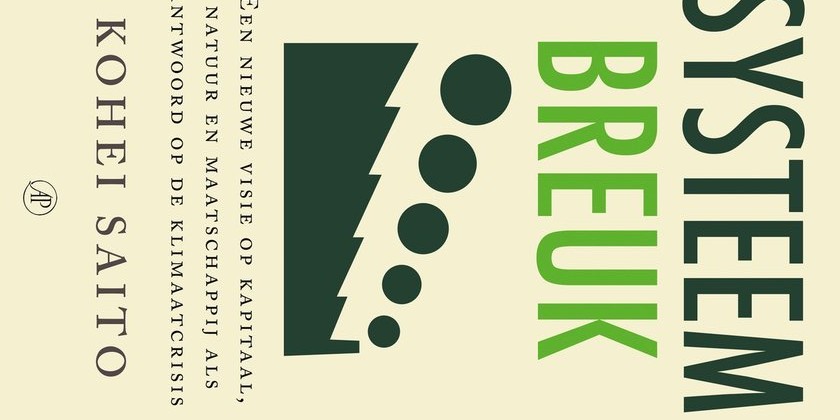Usually in Dutch, now in English, this is the next book review on Marx in the Anthropocene by Kohei Saito. The review is part of the RiskSphere Book Club review series. The article was posted on LinkedIn as well.
Bart Vrancken dives into “Marx in the Anthropocene” by Kohei Saito — a radical critique of capitalism, ecology, and the future of our planet.
Saito challenges the myth that green growth will save us, advocating instead for a post-capitalist vision of degrowth communism, rooted in sustainability, shared ownership, and a revaluation of labour.
What do you think? Can capitalism be reformed or must it be replaced?
👉 Read the full review and give us your thought!
RiskSphere Book Club #6 – Marx in the Anthropocene by Kohei Saito
A radical critique of capitalism, ecology, and the future of our planet
Welcome to the sixth edition of the RiskSphere Book Club, where we explore literature that unpacks complex systems and the global forces shaping our world.
In this edition, I review Marx in the Anthropocene by Japanese philosopher Kohei Saito—recently translated into Dutch as Systeembreuk. While our previous review took us back to the fall of Bronze Age civilizations in 1177 BC, this one begins firmly in the present: with the accelerating collapse of the ecosystems that have sustained human life for millennia.
Saito’s book offers a sharp ecological critique of capitalism and traces how decades of neoliberal reform have intensified today’s climate crisis. He connects this crisis to the Anthropocene—the geological epoch in which human economic activity has transformed the Earth itself. His central question: Can capitalism coexist with a livable planet—or do we need a radical systems overhaul?
The Case for Systemic Change
At the heart of Saito’s argument lies a bold proposition: to confront the climate crisis, we must move beyond capitalism and embrace what he calls degrowth communism.
Drawing from newly published volumes of the Marx Engels Gesamtausgabe, Saito uncovers a lesser-known, ecological Marx—one who, later in life, advocated for sustainability, communal ownership, and constraints on industrial expansion. He argues that 20th-century Marxism largely ignored these ecological insights, focusing instead on industrial productivity. In today’s Anthropocene, however, Marx’s ecological perspective regains urgency.
Saito is skeptical of the belief that green technologies or the UN’s Sustainable Development Goals (SDGs) will deliver salvation. In his view, they’re comforting illusions that allow business-as-usual to persist. True sustainability, he argues, requires degrowth: deliberately reducing economic activity to relieve ecological pressure, rebalance wealth distribution, and revalue essential labor over profit.
The Limits of Green Capitalism
The rise of SDGs and “green growth” rhetoric may sound encouraging—but according to Saito, they’re part of the problem. Capitalism is structurally dependent on growth, externalizing environmental and social costs, often at the expense of the Global South.
Even green production requires energy, materials, and labor—frequently outsourced under exploitative conditions. Saito points to the COVID-19 lockdowns as a rare moment of pause, where a slowdown in consumption prompted reflection on the overproduction and overconsumption embedded in capitalist life. For him, degrowth is not idealism—it’s necessity.
He envisions a post-capitalist model based on the commons: shared ownership and stewardship of land, energy, and labor. In this vision, citizens generate energy through cooperatives, workers run their own enterprises, and investments serve long-term resilience—not short-term profits.
Critical Reflections
Saito’s work is provocative—but not without its blind spots.
His dismissal of capitalism’s achievements—such as poverty reduction, rising life expectancy, and advancements in healthcare—feels incomplete. Similarly, his critique of communism omits the suffering and repression under 20th-century regimes. A more balanced analysis would acknowledge both the strengths and the failures of these systems.
The idea that degrowth alone could halt climate change is also highly contested. Even if global GDP were cut in half, we would still need technological innovation to reach net-zero emissions. Low-cost, clean energy solutions must be part of the equation—and degrowth advocates often downplay their role, fearing that innovation will delay structural change.
Lastly, Saito’s vision underestimates human behavior. People seek to improve their condition, to distinguish themselves, to pursue different ambitions. Worker cooperatives might struggle with internal inequality and diverging incentives. Capitalism, for all its flaws, has offered a system to allocate scarce resources through pricing and competition. Saito’s alternative lacks clarity on how such coordination would function at scale.
Recommendation
Kohei Saito’s Marx in the Anthropocene is a must-read for those interested in what Marx still has to say in the age of ecological breakdown. While the book is not without its shortcomings, it offers an original perspective on the structural tensions between capitalism and sustainability.
Saito reminds us that economic growth is not neutral—it often comes at the expense of nature, the global South, and future generations. His call for degrowth communism may be contentious, but it adds a vital voice to the debate on what comes after capitalism.
Final Thoughts
Marx in the Anthropocene challenges the dominant narrative that we can innovate or regulate our way out of ecological collapse without rethinking capitalism itself. Whether you agree or disagree with Saito’s conclusions, the book is a timely, thought-provoking read.
For professionals working in sustainability, risk management, and policy, it’s a compelling exploration of how deeply the economy is entwined with the environment—and how difficult it will be to change one without changing the other.
Rating
⭐⭐⭐☆☆ (3 out of 5)
Despite its blind spots, Marx in the Anthropocene offers a fresh perspective on Marx and highlights capitalism’s reliance on finite resources. It’s a valuable addition to the ongoing conversation about systems change.
What do you think? Can capitalism be reformed—or must it be replaced?
#RiskSphere #BookClub #Capitalism #Degrowth #Marx #Sustainability #Ecology #SystemChange
